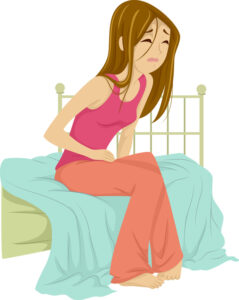
Premenstrual syndrome or PMS is the term used to describe a wide variety of physical and emotional symptoms that women commonly experience in the days leading up to a menstrual cycle (period). They can also continue for the first few days of a period.
These symptoms can vary in intensity from cycle to cycle but tend to recur in a predictable pattern.
Emotional symptoms may include depression, tension, anxiety, sadness, irritability, anger, mood swings, insomnia, poor concentration, changes in libido, social withdrawal and food cravings.
Physical symptoms may include headaches, muscle pain, fatigue, appetite changes, fluid retention, bloating, constipation, diarrhoea, acne, clumsiness, poor coordination and breast tenderness.
While it is not fully known what causes PMS, several factors may contribute, including:
- cyclical changes in oestrogen and progesterone
- fluctuations in serotonin levels in the brain
- underlying depression
- poor physical health
- stress levels and psychological health
- genetic determinants
- smoking
- high Body Mass Index (BMI)
PMS symptoms affect most women to some extent. Upwards of 75% of women experience symptoms that are very mild, where around 25% experience symptoms that are more severe.
Sometimes, symptoms can affect some women in such debilitating ways that it affects their quality of life. This is known as Premenstrual Dysphoric Disorder (PMDD). It affects around 3-8% of women and can be so severe that sufferers are unable to function in their normal daily lives. PMDD usually requires a combination treatment approach with lifestyle changes, anti-depressant medication and oral contraceptives to manage hormone levels.
Symptoms of PMS usually subside once a period begins. They do not persist after a woman goes through menopause and they do not occur in women who do not ovulate.
Some helpful ways to manage this difficult time of the month include:
- Physical activity – Although it may be the last thing you feel like doing, exercise increases endorphins which can help you feel physically better and mentally more relaxed and in control.
- Stress reduction – Take time to relax and enjoy some personal time. If you struggle to control your stress, counselling that incorporates Cognitive Behavioural Therapy (CBT) or mindfulness techniques can be beneficial.
- Eat a healthy, varied diet – Incorporating fresh fruits, vegetables and whole grains. Salt intake should be limited to help reduce fluid intake.
- Get plenty of rest and sleep
- Drink plenty of water
- Don’t smoke or quit smoking
There are medication options available to help manage symptoms which may be taken continuously, or in the premenstrual period only. Medication options include oral contraceptives, anti-depressants, ovulation suppressants and other products that can be prescribed by your Doctor after appropriate discussion.
There is some, limited evidence to suggest that supplements such as magnesium, Vitamin B6, chaste tree, calcium and evening primrose oil can be useful in reducing the severity of some symptoms of PMS. If you are considering any supplement, it is a good idea to discuss this with your Doctor first as many supplements can have serious interactions with other medications you may be taking.
Many women find it useful to keep a symptom ‘diary’, jotting down the symptoms and their severity as they occur through the pre-menstrual period. This can help you recognise patterns and perhaps plan for likely symptoms.




